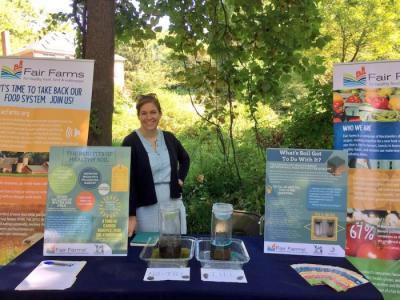Expert Spotlight: 5 Questions with Alicia LaPorte, Fair Farms
ARAC works with a wide network of organizations in the U.S. and globally. One such group is Fair Farms, a coalition of environmental and public health groups, businesses, consumers, and farmers committed to a sustainable food system. ARAC recently joined the new campaign, Fair Farms Fair Choice, an effort to get Mid-Atlantic grocery chain Weis Markets to help fight drug-resistant superbugs by changing their store brand chicken from Sanderson Farms to a brand that has better antibiotic use policies.
This month we’re talking to Alicia LaPorte, Campaign Manager for Fair Farms, who explains their latest campaign focused on addressing antibiotic resistance and battling superbugs.
1. Can you tell us more about Fair Farms and what your goals are?
Fair Farms is a grassroots movement in the Chesapeake watershed region committed to building a sustainable and fair food system. We seek to create awareness about the relationship between agriculture, water, food and public health; galvanize citizens to reduce agricultural pollution; and support farmers, businesses and public policies that promote healthy, sustainable agricultural practices. For too long, the issues of food, water, land use, and public health have been disconnected from one another. Our food systems, health, and ecosystems are all out of balance, and to heal one we must heal them all.
For instance, antibiotic resistance is rising due in part to overuse of the drugs in animal agriculture -- sometimes to compensate for keeping livestock in overcrowded conditions with a large amount of concentrated waste. The overwhelming amount of animal waste produced in a confined animal feeding operation may find its way to nearby streams and waterways, resulting in massive dead zones. Thanks to government subsidies that tend to go to vertically integrated industries and to very large farms, industrially produced food is priced artificially low, without recognition of the externalized costs to our environment. As a result, it is difficult for independent and regenerative farmers to compete in the marketplace, and monoculture in our food and farming system predominates, which leaves rural communities and local farm economies in a precarious position of placing all their eggs into one basket. It’s all connected.
2. Why did you decide to launch your new campaign asking Weis Markets to change their store-brand chicken?
Simply put, the world is at a crisis point when it comes to antibiotics. We are already losing the most vital tool of modern medicine because antibiotics are being misused and overused. Fair Farms Wise Choice is an effort to get Mid-Atlantic grocery chain Weis Markets to do its part in fighting drug-resistant superbugs. We are asking them to stop selling Sanderson Farms chicken as their store-brand, unless Sanderson cleans up its act. Unlike the two other largest chicken producers in the country that have committed to fighting superbugs by adopting a responsible antibiotics policy, Sanderson boasts that it “has raised its broiler chickens with antibiotics for 70 years, and has no plans to change.” The company dismisses decades of scientific research that connects the routine use of human antibiotics in livestock with the rise of antibiotic resistant bacteria globally. Sanderson even launched a misleading advertising campaign claiming that poultry raised without antibiotics is just a “marketing gimmick.” This is infuriating!
Many of Fair Farms’ grassroots supporters shop at Weis Markets and were surprised and deeply concerned to learn that Sanderson was being sold as the store brand. Because there is no easily identifiable labeling on the packaging -- in fact, it is marketed as ‘all natural’ -- Weis customers may be inadvertently supporting a company that contributes to the superbug crisis and provides misinformation about antibiotic resistance. Weis customers deserve a better choice and, with an estimated 45-50 percent of the poultry industry producing chicken without routine antibiotic use, the store has other, better options for sourcing.
We need as many folks as possible to ask Weis to help fight superbugs. Will you sign our petition?
3. Why do you think antibiotic resistance is such an important issue?
Before joining Fair Farms, I worked for many years on the antibiotic resistance issue at The Pew Charitable Trusts and with the great team at ARAC. The superbug crisis is absolutely terrifying and if society doesn’t make big changes in hospitals, at the doctor’s office, and in the barnyard, we are literally jeopardizing our future. The more you learn about the issue, the more you see that we are already feeling its disastrous impacts and how little time we have to get ahead of the issue.
As hopeless as it can sometimes feel, the bright spot is that we know what we have to do to get ahead of this crisis and we are already seeing big changes. For instance, last year Maryland became the second state in the country to pass a law banning routine antibiotic use in livestock in the state. We need to galvanize policymakers, citizens, and health experts to make changes and investments now, before it’s too late.
4. What’s a Fair Farms consumer? What tips can you give to consumers to support a sustainable food system?
Fair Farms consumers have committed to making smart, informed choices about what they purchase and eat, lift up their voices to end harmful farming practices, support sustainable farmers, and demand transparency and accountability from the agricultural industry. Consumers can have tremendous impact on our food system by voting with their dollars and being a voice for policy change -- just look at how far the poultry industry has come regarding antibiotic use!
The best way to learn more about the food system is to speak with farmers! Whenever possible, shop at a farmers market, and ask the growers how they produce the food, if chemicals were used, and how they are working to be good environmental stewards. I would also recommend folks do their homework. There are many misleading labels and sustainability claims being made in the marketplace, and consumers need to be increasingly savvy to know which they should trust. Fair Farms has compiled some resources on our website, which could be a good place to start.
5. We love your newsletter - a mixture of helpful tips, the latest news and ways to get involved. It always makes working with Fair Farms looks so fun! What’s your favorite part of working with a large network of sustainable and healthy food system advocates and farmers? How can our readers sign up for your newsletter if they would like to receive it?
You are so kind. I love your newsletter, too! Working for Fair Farms is indeed pretty fun. It’s a great mix of working on local and federal policy change, consumer education, and lifting up the stories and voices of movers and shakers in our network. My favorite part, hands down, is visiting and supporting farmers who prove everyday that you can produce food in a way that not only sustains but also regenerates our land, waterways, health, and communities.
You can sign up for our newsletter by visiting www.FairFarms.org and filling in your email in the top right corner box. Folks can also stay involved by engaging with us on social media: Facebook, Twitter, Instagram.



